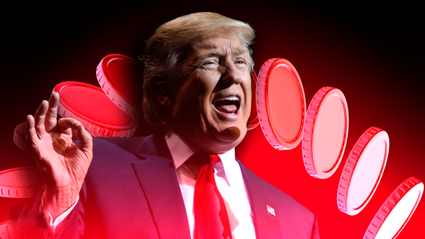President Trump Pushes GENIUS Act: A Legislative Turnaround for Stablecoins in the US

US President Donald Trump has announced a major breakthrough in his push for the GENIUS Act, a stablecoin regulation bill, after winning key support from key lawmakers in Congress. The announcement, made Tuesday evening after a closed-door meeting in the Oval Office, marks a significant milestone in the process of creating the first legal framework in the US for digital currencies pegged to the US dollar.
According to Mr. Trump's sharing on the social network Truth Social, he had a direct conversation with 11 of the 12 Republican congressmen needed to ensure the passage of the vote procedure, and received a comprehensive consensus. House Speaker Mike Johnson also participated by phone and expressed strong support for the expedited legislative process.
Resurrected from House Defeat
The announcement comes just hours after the GENIUS Act, along with other “Crypto Week” legislation, failed in a procedural vote of 196-222. The defeat came amid divisions within the Republican Party, with the House Freedom Caucus opposing the bundling of the GENIUS Act with other bills like the Clarity Act and the defense appropriations bill.
President Trump’s quick re-election of key lawmakers underscores the strategic importance he places on legitimizing stablecoins, a class of digital assets that are playing an increasingly large role in the global financial system.
GENIUS: A Comprehensive Regulatory Framework for Stablecoins
The GENIUS Act is designed to establish a comprehensive regulatory framework for the U.S. dollar-pegged stablecoin market, providing clear oversight and empowering the U.S. Treasury to regulate issuers. The bill also proposes creating licensed pathways for both banks and private companies to issue stablecoins, laying the groundwork for a legitimate digital dollar ecosystem in the United States.
The US Senate passed the bill in June by a 68–30 vote, a rare bipartisan consensus in a polarized political climate. However, some Democrats have expressed concerns about the bill’s connection to Trump’s crypto policy.
Market Impact and Growth Forecast
Treasury Secretary Scott Bessent has said that if enacted, the GENIUS Act could be a catalyst for the US stablecoin market to expand from its current size of around $238 billion to over $2 trillion in the next few years. This would be a quantum leap that could reshape the entire digital financial ecosystem in the US, especially in competing with stablecoin platforms backed by China and Europe.
The Act is also expected to open the door for traditional financial institutions from commercial banks to fintech companies to participate more deeply in the field of issuing and using stablecoins in payments, trade and financial services.
Strategic Goal: Leading Global Financial Technology
In recent statements, Mr. Trump emphasized that establishing regulations for stablecoins is not only a financial issue, but also a strategic one to protect the technological advantage and the strength of the US dollar against the rise of global digital currency models. He sees stablecoins as a bridge between digital assets and the traditional financial system, and a tool to strengthen the global position of the United States.
According to industry observers, the GENIUS Act is currently one of the most likely legislative proposals to be passed related to cryptocurrencies, thanks to the consensus among lawmakers, the business community and regulatory agencies.
Trump Administration’s New Approach to Crypto
Trump’s announcement demonstrates consistency in the pro-crypto policy that has been a hallmark of his campaign and new term. From criticizing the SEC to supporting blockchain innovation, the Trump administration is creating a clear roadmap for advancing digital finance.
Concluding his speech, Trump thanked the lawmakers who agreed to “close” their votes the following morning, and expressed confidence that the upcoming vote will pave the way for legalizing stablecoins, the new financial foundation of the 21st century.
If passed this week, the GENIUS Act could be the biggest milestone in the history of digital currency regulation in the United States, establishing the United States as a global leader in stablecoins and digital assets.
